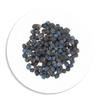About
Our certified Organic Sloe Berries are the fruit of the Blackthorn tree, famous as the essential ingredient for classic sloe gin. These tart, astringent berries infuse spirits and syrups with a stunning ruby colour and a complex, fruity, almond-like flavour.
Note: Sloe berries are extremely tart and are intended for infusing, not for eating raw.
As always, it's advisable to consult with healthcare professionals for personalised guidance on health concerns.
Directions of Use
1. To make sloe gin, rinse the berries and ensure they are pierced. You can do this by pricking each one or by freezing them overnight and letting them thaw, which splits the skins.
2. Place approximately 450g of sloe berries in a large, sterilised glass jar or demijohn.
3. Add 225g of sugar and 1 litre of good quality gin. Seal tightly and shake well to combine.
4. Store in a cool, dark place for at least two to three months, shaking the jar every few days for the first couple of weeks until the sugar has fully dissolved.
5. Strain the finished gin through muslin or cheesecloth into clean bottles. The flavour will continue to improve and mellow with age.
Specifications
| Ingredient Declaration: |
100% Organic Sloe Berries (Prunus spinosa) |
| Shelf Life: |
Up to 24 months if stored properly |
| Packaging: |
Packaged in food-safe, recyclable or biodegradable materials |
| Processing: |
This product has undergone freeze treatment to reduce the risk of insect contamination |
| Allergen Summary Statement: |
No known allergens. Trace elements may be present - check with HC for more details if required. |
| |
The Herbal Connection makes no Allergen Free claims. |
Store below 23 °C in a sealed, dry container. Avoid exposure to moisture and direct light.
The Herbal Connection is a family-run Australian business committed to premium, certified organic ingredients for wholesale and retail customers.
Disclaimer: This product is sold as a food only and is not intended to diagnose, treat, cure or prevent any disease.
Sloe also known as Blackthorn (Prunus spinosa) is a thorny hedgerow plant with dark purple berries often sought after in autumn to make warming country wine or gin.
The small tree or shrub also has a firm place in folk history and medicine in the British Isles.
Food Uses
Picking sloes, or blackthorn berries, in autumn, is a well-kept countryside tradition in Britain, Ireland and parts of Europe. The fruit is often made into sloe wine or gin. Sloes are also used to make jam and jelly.
The flowers can be sugared for edible cake decorations REF and a tea can be made from the leaves.REF
Nutritional Profile
Fresh sloes contain about 10 mg of vitamin C and 5 mg of vitamin E per 100g. They are rich in other nutrients: 453 mg potassium, 5 mg calcium and 22 mg magnesium per 100g.REF
The fruit are also very high in antioxidant compounds phenols and flavonoids, and in essential fatty acids, which are thought to bring many health benefits such as reducing the incidence of chronic disease.REF
Sloe Recipes
- Traditional sloe gin
- Sloe hedgerow jam
Traditional Medicine Uses
The astringent berries and bark have been used to treat diarrhoea, while the flowers have been used as a laxative.REF
Sloes were also used as remedies for coughs and colds because of their astringency. The peeled bark boiled in water was a gypsy remedy for bronchitis.
Other Uses
This prickly shrub has made an excellent hedgerow for centuries, providing a nearly impenetrable barrier for fields and coasts.
Cautions
There is little conclusive data on the toxicity of blackthorn, although caution is always advised when using any medicinal herb during pregnancy or when breastfeeding, or when using alongside a prescribed medication for a specific condition. Consult your healthcare adviser first.








